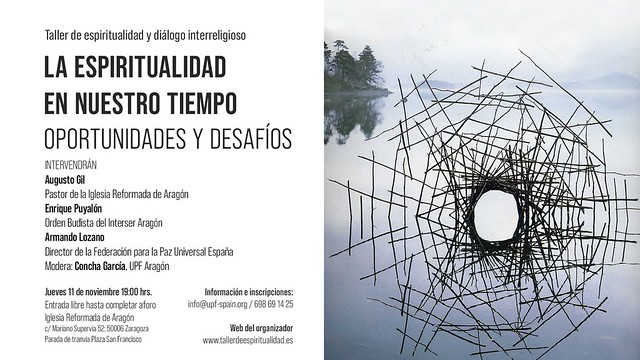Zaragoza, Spain—UPF organized an interfaith event whose theme was “Spirituality in Our Time: Challenges and Opportunities.”
Twenty-six people attended the discussion, which was held on November 11, 2021, in the Reformed Evangelical Church of Aragon.
The pastor of the church, Augusto Gil, was the first speaker. In these modern times, he said, people have changed their way of approaching God or another divinity, and the publishing houses know it. That is the reason for a large number of books on the market today dedicated to religiosity and spirituality, either from the Buddhist tradition, the Catholic tradition, or the Evangelical tradition.
Pastor Gil asked: What is spirituality? It is a new, emergent term, he said. In the European and Spanish context, the noun “spirituality” has been absent from our vocabulary. The spiritualists were the Confucianists, the Tibetans, the Hindus, the Sufis, but from Greece to the West we were considered more “religious” than spiritual, he said.
Speaking from his experience with the Reformed Christian tradition, he mentioned four vocations: a shared spirituality; an open spirituality; a communal spirituality; and an evangelizing spirituality.
Pastor Gil mentioned that he was born in Cuba under a Marxist-communist dictatorship, but that he has Presbyterian ancestors.
“I am a third generation of Reformed Christians living in that country that is Cuba,” he said. “It was a daily challenge to be a Christian. I was born in a rural family, and we did not have a Bible, so we children learned the texts by heart.” He added that if something is going to transcend our way of living faith, it will be through compassion.
The next speaker was Enrique Puyalon from the Center for Zen and Mindfulness Meditation (Thích Nhất Hạnh tradition). Spirituality in Zen Buddhism is lived in the past, present, and future, he said, but Buddhists always try to live in the “here and now.”
We are all connected, he said, but our ego creates emotions that take us away from our inner essence. How is spirituality lived in Buddhism? With the energy of full consciousness, in the present moment. The energy of concentration originates from full consciousness, and this leads to compassion with oneself and toward others.
Mr. Puyalon said that in Buddhism there are four mental practices that help us become closer to others:
- Open-mindedness; no dogma, no fanaticism; inclusivity, tolerance. From compassion we embrace people.
- Non-attachment to ideas. Avoid letting ideas separate us from others.
- Freedom of thought. Feeling it in the heart.
- Awareness of suffering. Compassion is being next to the one who suffers.
The last speaker was Armando Lozano, director of UPF in Spain. The current times may seem very dramatic because the churches and temples are empty, there are no vocations, etc. However, that is something positive, he said, because it means the end of “formal religiousness.” It is not the end of God; it is the end of religion as we have understood it. The sacred will always be by our side, knocking on our door.
Throughout history there has always been a move toward greater spirituality, Mr. Lozano said. Today the ability for people to access their traditions is better than ever. What does the world need? Today, due to tourism, the internet and media, we feel closer to each other. More than ever, he said, the winds of the world point toward a global family. Therefore, a spirituality that does not support the global family is going to have a difficult time.
He asked: How can interreligious dialogue help us? To go to the essence of things. And what is essential? It is a common language, the language of love, the language of service, the language of sacrifice. It is a universal language.
Mr. Lozano explained that UPF was established in 2005 by the Rev. Dr. Sun Myung Moon from Korea, who for decades promoted interfaith dialogue. He added that spirituality is the path of serving. It is an open-door spirituality, serving neighbors, serving the community, serving society. Society needs people who are good examples. In short, whatever path we follow, God will work in a mysterious way if we put our abilities at the service of others.
Although we were a group of 26 people, a fraternal atmosphere of mutual respect was created, with the desire to meet again in the near future.

